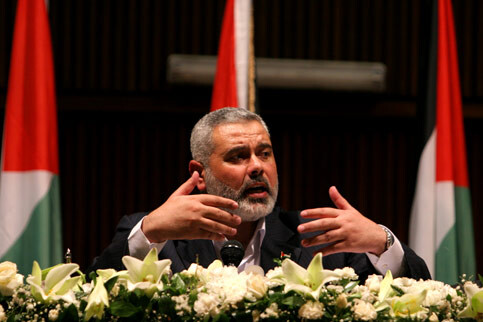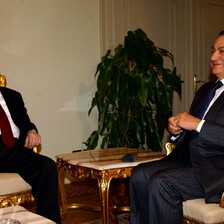The Electronic Intifada 28 June 2007

Deposed Palestinian Prime Minister Ismail Haniyeh of Hamas attends a conference in Gaza City, 24 June 2007, after rejecting an Egypt summit planned with Israeli and Arab leaders, saying only “resistance” would produce results for his people. (Wissam Nassar/MaanImages)
CAIRO, Jun 27 (IPS) - Almost two weeks after the takeover of the Gaza Strip by Palestinian faction Hamas, attempts by Cairo to resolve the crisis have so far come to naught. But while government officials say mediation efforts are still under way, some commentators question the ability of Egypt — a longtime supporter of Hamas rival Fatah — to mediate impartially.
“Egypt’s open support of Fatah has cost it all credibility as an arbitrator,” Gamal Zahran, political science professor at Suez Canal University and speaker for the independent bloc in parliament told IPS.
On 14 June, after six days of fighting that left more than 100 dead, Palestinian resistance movement Hamas wrested control of the Gaza Strip from the western-backed government of Fatah-affiliated Palestinian President Mahmoud Abbas. Hamas fighters seized almost all government institutions in the territory, including the presidential residence in Gaza City.
Declaring a state of emergency from the Fatah-dominated West Bank, Abbas responded by announcing the dissolution of the previous government of national unity led by Hamas-affiliated Prime Minister Ismail Haniyeh. In Haniyeh’s place, Abbas appointed Salam Fayyad, a political independent and former World Bank official.
Hamas leaders in Gaza, however, refused to recognise the declaration, with Haniyeh announcing his intention to stay on as prime minister.
The new state of affairs effectively divides the Palestinian people into two distinct cantons, with Hamas in control of the Gaza Strip — home to some 1.5 million people — and Fatah dominating the larger West Bank.
The upset sounded the death knell for the Saudi-sponsored Mecca Agreement, which had temporarily put an end to inter-Palestinian fighting earlier this year. That deal, which leaders from both sides signed at the Saudi city of Mecca in February, also laid down the parameters of the now-defunct unity government.
At an emergency meeting of Arab foreign ministers at the Arab League’s Cairo headquarters on 15 June, Saudi foreign minister Emir Saud Al-Feisal blasted both sides for breaking the terms of the agreement.
“The day draws nigh when the Palestinians themselves will hammer the final nail into the coffin of the Palestinian cause,” he was quoted as saying. “They would be better served by returning to the terms of the Mecca Agreement.”
Egypt was more specific in apportioning blame, pointing the finger squarely at Hamas for the dangerous turn of events. In a statement, the foreign ministry made clear its support for Fatah, urging “Palestinians of all factions to rally around the legitimate leadership” of Abbas and his newly appointed government.
“What happened in the Gaza Strip was nothing less than a military coup d’etat,” Mohamed Basyouni, former Egyptian ambassador to Israel and head of the Shura (parliamentary) Council’s committee for Arab affairs, told IPS. “It was totally illegitimate.”
Egyptian support for Fatah is no secret. Since Hamas won a landslide victory in Palestinian parliamentary elections early last year, Cairo has provided the Fatah-controlled Palestinian Authority with varying degrees of financial and logistical support.
Egypt, which is itself backed by the U.S., has also provided Fatah security cadres with military training. As the Gaza Strip fell to Hamas, some 70 Fatah loyalists, reportedly including security officers, fled across the border to Egypt for temporary asylum.
At the same time, Cairo — which signed a peace treaty with Israel in 1979 — sees the Hamas movement’s code of perpetual resistance to Israel as a challenge to its own popular legitimacy. Hamas is also a close relative of the Egyptian Muslim Brotherhood, the rising preponderance of which remains Cairo’s foremost domestic concern.
Yet despite Cairo’s stated support for Fatah and the new Fayyad government, foreign ministry officials say mediation efforts remain ongoing.
“We are not at war with Hamas. We are talking to them and we are still trying to initiate dialogue between the factions during the coming month,” an unnamed Egyptian diplomat was quoted as saying in the state press 21 June. “We just do not agree with what Hamas did, and we are making this clear.”
Bassyouni confirmed that Cairo was still talking to all parties to the conflict.
“Mediation efforts are still under way with all factions, including Hamas,” he said. He went on to describe Egypt — a traditional intermediary in Palestinian affairs — as “the only Arab capital with the diplomatic weight to reconcile the warring parties.”
But some local commentators challenge this assertion, saying instead that Arab governments, especially US-friendly ones, are for the most part helpless to resolve the crisis.
“The Arab regimes, particularly the so-called moderates, like Egypt, Jordan and the Gulf States, can help bring a measure of calm to the situation, but they can’t provide a lasting resolution,” said Zahran. “After all, they ultimately work for the interests of the U.S. and Israel.”
Zahran went on to say that the situation in Gaza was “a direct result of the Arab regimes’ lack of credibility on the street and their absolute failure to revive the so-called peace process.”
Questioning Cairo’s unconditional support for Abbas, Zahran added, “Abbas may be the elected Palestinian president, but Hamas enjoys legitimacy as the people’s choice in parliament.”
In a further effort to bolster Fatah, Egypt hosted Abbas at a 25 June conference at the Red Sea resort city of Sharm al-Sheikh, where he reportedly discussed the Israeli-Palestinian peace track with Israeli Prime Minister Ehud Olmert. According to press reports, Olmert told Abbas that Israel planned to “work with the new (Palestinian) government and maintain frequent meetings with it”.
The summit, to which Hamas representatives were not invited, was also attended by Egypt’s President Hosni Mubarak and King Abdullah II of Jordan.
All rights reserved, IPS – Inter Press Service (2007). Total or partial publication, retransmission or sale forbidden.
Related Links


